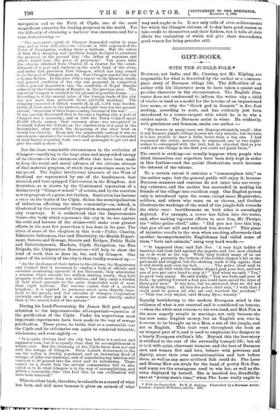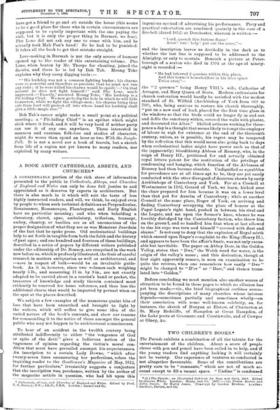GIFT-BOOKS.
WITH THE JUNGLE-FOLK.*
BIIRMAII, not India, and Mr. Coming, not Mr. Kipling, are responsible for what is described by the author as a common-
place story of Burmese village life. The difficulties of an author with his illustrator seem to have taken a quaint and peculiar character in the circumstances. The English illus- trator does not condescend to inform the writer why a child of twelve is used as a model for the heroine of an impassioned love scene, or why the " Greek god in flannels" is five foot nothing, according to scale, and has evidently just been introduced to a tennis-racquet with which he is to win a cricket match. The Burmese artist is wiser. He evidently, with gentleness and firmness, snubs our author :—
" His houses in many cases are disproportionately small : this is not because jungle village houses are very minute, but because it is less trouble to draw a little house than a big one. I had requested the artist, moreover, to represent one or two night- scenes to correspond with the text, but he objected that as you could not see things in the dark you could not paint them."
The result is striking—as usually happens when people who think themselves our superiors have been duly kept in order in this fashion—and the quaint illustrations much increase
the interest of the volume.
To a certain extent it contains a "commonplace tale," as the author says; bat the general public will enjoy it, because Burmese manners and customs do not enter into our every-
day existence, and the author has succeeded in making his friends of the village into excellent copy. One English person only is introduced upon the scene, except some Magistrater, soldiers, and others who come on as chorus, and further illustrate the workings of the mind of the jungle-folk towards the white race : bewilderment on both sides is amusingly depicted. For example, a rower has fallen into the water, and, after making vigorous efforts to save him, Mr. Thorpe, the " white police chief," asks : " Did you not love this boy,
that you all sat still and watched him drown P " This piece of injustice recalls to the men when smoking afterwards that another incomprehensible Englishman had called some of them "fools and animals," using very hard words :-
"' It happened thus,' said Zah Nee. A very high ladder of bamboos had been laid against the pagoda, and two men climbed up to do work at the top. While they worked many of us sat watching ; presently the bottom of the ladder slipped a bit on the pavement and stopped, but the shaking made it slip again; then it slid slowly past over my feet The police chief said to us, " You sat still while the ladder slipped past your feet, and not one of you put out a hand to stop it ? " And when we said, " Yes," he grew very angry. He said loudly, " You are fools and sons of fools ; by putting forward a foot you could have saved the lives of these poor men." It was true, but we answered that we did not think of doing that. At this the police chief said, "I wish that I could send to prison all who sat and watched the accident." ' —' That was very unjust,' said Moung Byoo, warmly."
Equally bewildering to the modern European mind is the evidence of what is not resented and is considered an honour, —when the white man returns to his own land, and Mah Pan is the more eagerly sought in marriage, not only because she has now some English money, but an English son, who is, however, to be brought up as a Man, a son of the jungle, and not as English. This trait runs throughout the book as an integral part of it, and is used to emphasise the dangers in a lonely European civilian's life. Beyond this the love-story is subdued to the rest of the outwardly tranquil life; but all is told with quiet, observant humour, and the best of Burmese men and women flirt and love, behave with pettiness and dignity, scout their own conventionalities and bow before them, as well as any more civilised folk could do. Pho Lone and Moung Maw are rivals for the hand of pretty Mah Pan, and many are the stratagems used to win her, as well as the wiles displayed by herself. She is insulted too, dreadfully, once at "young man's time," when Pho Lone really ought to
• With the Jungle-Folk. By E. D. Coming. Illtmtmted by s Burmese Artist. London: Osgood, Mcilvaine, and Co. 1897.
have got a friend to go and sit outside the house (this seems to be a good place for those who in certain circumstances are
supposed to be equally important with the one paying the visit, but it is only the proper thing in Barmah, we fear). Pho Lone did not ask any one to come with him, and he
actually took Mah Pan's hand ! So he had to be punished. It takes all the book to get that mistake straight.
Love-making in Bnrmah is not the only source of humour opened up to the reader of this entertaining volume. Pho Lone, when beaten by Mr. Thorpe for cheating, joined the dacoits, and there be is led by Boh Tah. Moung Toke explains why they carry digging tools :-
" r His lordship was not a common fighting leader ; his charms were so powerful and therefore so precious that he must not run any risks ; if ho were killed his charms would be spoilt:—' On that account he does not fight himself ?' said Pho Lone. much impressed.= Exactly,' assented Moung Toke, His lordship is a Pit-hiding Chief. We now go to dig the hole in which he will hide to-morrow, while we fight the village-men ; his charms being thus safe from hurt will protect all into whose hand his lordship shall give a little magic rice.'"
Boh Tah's career might make a small point at a political meeting ; a " Pit-hiding Chief " is an epithet which might stick where it fitted, and it will be very hard if neither party can use it of any one, anywhere. Those interested in manners and customs, folk-lore and studies of character,
might do worse than spend an hour or two With the Jungle- Folk. It is not a novel nor a book of travels, but a sketch from life of a region not yet known to many readers, nor exploited by many writers.























































 Previous page
Previous page